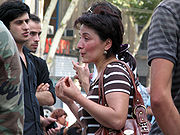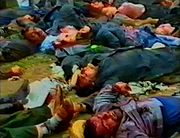
Ethnic cleansing of Georgians in South Ossetia
Encyclopedia

Georgian people
The Georgians are an ethnic group that have originated in Georgia, where they constitute a majority of the population. Large Georgian communities are also present throughout Russia, European Union, United States, and South America....
, which was conducted in South Ossetia
South Ossetia
South Ossetia or Tskhinvali Region is a disputed region and partly recognized state in the South Caucasus, located in the territory of the South Ossetian Autonomous Oblast within the former Georgian Soviet Socialist Republic....
and other territories occupied by Russia
Russia
Russia or , officially known as both Russia and the Russian Federation , is a country in northern Eurasia. It is a federal semi-presidential republic, comprising 83 federal subjects...
n and South Ossetian forces, which happened during and after the 2008 South Ossetia war
2008 South Ossetia war
The 2008 South Ossetia War or Russo-Georgian War was an armed conflict in August 2008 between Georgia on one side, and Russia and separatist governments of South Ossetia and Abkhazia on the other....
.
The Human Rights Watch
Human Rights Watch
Human Rights Watch is an international non-governmental organization that conducts research and advocacy on human rights. Its headquarters are in New York City and it has offices in Berlin, Beirut, Brussels, Chicago, Geneva, Johannesburg, London, Los Angeles, Moscow, Paris, San Francisco, Tokyo,...
concluded that the "South Ossetian forces sought to ethnically cleanse" the Georgian-populated areas. In 2009, the Parliamentary Assembly of the Council of Europe
Parliamentary Assembly of the Council of Europe
The Parliamentary Assembly of the Council of Europe , which held its first session in Strasbourg on 10 August 1949, can be considered the oldest international parliamentary assembly with a pluralistic composition of democratically elected members of parliament established on the basis of an...
resolutions condemned "the ethnic cleansing and other human rights violations in South Ossetia, as well as the failure of Russia and the de facto authorities to bring these practices to a halt and their perpetrators to justice". According to the September 2009 report of the European Union
European Union
The European Union is an economic and political union of 27 independent member states which are located primarily in Europe. The EU traces its origins from the European Coal and Steel Community and the European Economic Community , formed by six countries in 1958...
-sponsored Independent International Fact-Finding Mission on the Conflict in Georgia, "several elements suggest the conclusion that ethnic cleansing was carried out against ethnic Georgians in South Ossetia both during and after the August 2008 conflict."
1991–1992 South Ossetia War

South Ossetian Autonomous Oblast
The South Ossetian Autonomous Oblast was an autonomous oblast of the Soviet Union created within the Georgian SSR on April 20, 1922. Its autonomy was revoked on December 10, 1990 by the Supreme Soviet of the Georgian SSR, leading to the First South Ossetian War...
and in Georgia proper between ethnic Ossetian paramilitary troops and Georgian Interior Ministry (MVD) units and paramilitaries. South Ossetia declared its independence from Georgia. In turn, Georgia abolished South Ossetian autonomous status, which existed since early Soviet years. The Georgian government, led by the president Zviad Gamsakhurdia
Zviad Gamsakhurdia
Zviad Gamsakhurdia was a dissident, scientist and writer, who became the first democratically elected President of the Republic of Georgia in the post-Soviet era...
, responded by sending in army and paramilitary units, in an attempt to restore its control of the region.
On the night of 5 January 1991, 6,000 armed Georgians entered Tskhinvali, causing destruction in the city and killing civilians. After fierce street fighting, the Georgian forces were repelled and driven out of Tshkinvali by South Ossetian troops.
As a result of the war, approximately 100,000 ethnic Ossetians fled from the South Ossetian A.O. and Georgia proper, and 23,000 ethnic Georgians fled from the South Ossetian A.O. into ethnically Georgian areas. One hundred villages were reportedly destroyed in South Ossetia by both sides. Additionally, the North Ossetia-Georgian border went largely uncontrolled, providing an almost unhindered access point for weapons, fighters, and ammunition in both directions.
A deputy to the North Ossetian Supreme Soviet explained, "When the war began in South Ossetia
South Ossetia
South Ossetia or Tskhinvali Region is a disputed region and partly recognized state in the South Caucasus, located in the territory of the South Ossetian Autonomous Oblast within the former Georgian Soviet Socialist Republic....
, back than an autonomous region of Georgia there were thousands of refugees....Naturally, those Ossetian refugees from South Ossetia and from Georgia who fled here wanted to kick out Georgians living here. There are 15,000 Georgians living here, just in Vladikavkaz...We stopped this, no one fled".
Comments on the 2008 ethnic cleansing of Georgians in South Ossetia
- The AustraliaAustraliaAustralia , officially the Commonwealth of Australia, is a country in the Southern Hemisphere comprising the mainland of the Australian continent, the island of Tasmania, and numerous smaller islands in the Indian and Pacific Oceans. It is the world's sixth-largest country by total area...
n paper The AgeThe AgeThe Age is a daily broadsheet newspaper, which has been published in Melbourne, Australia since 1854. Owned and published by Fairfax Media, The Age primarily serves Victoria, but is also available for purchase in Tasmania, the Australian Capital Territory and border regions of South Australia and...
quoted Major-General Vyacheslav BorisovVyacheslav BorisovVyacheslav Nikolaevich Borisov is a Russian major-general of the 2008 South Ossetian War.-Early life and Career:Borisov was born in Ruza, near Moscow, during the rule of the Soviet Union...
, the commander in the Russian-occupied city of Gori in their description of the circumstances: "There is growing evidence of looting and "ethnic cleansing" in villages in the area of conflict between Russia and Georgia. The attacks — some witnessed by reporters or documented by a human rights group — include stealing, the burning of homes and possibly killings. Some are ethnically motivated, while at least some of the looting appears to be the work of opportunistic profiteers. The identities of the attackers vary, but a pattern of violence by ethnic Ossetians against ethnic Georgians is emerging and has been confirmed by some Russian authorities. "Now Ossetians are running around and killing poor Georgians in their enclaves," said Major-General Vyacheslav Borisov, the commander in the Russian-occupied city of Gori." The Norwegian Helsinki Committee, in cooperation with three other human rights organisations, conducted an investigation which concluded that ethnic cleansing continues in the de-facto border region between Georgia and South Ossetia. "The Human rights monitors found evidence of the burning of houses, attacks on civilians and forced displacement of the Georgian population as late as Friday 17 October. The material collected describes 16 alleged cases of killings of civilians (excluding deaths resulting from cross fire, bombing and shelling at the time of large scale military operations, and accidents with unexploded ordnance), in areas controlled by Russian forces, many of which seems to be instances of summarily executions.". - Human Rights WatchHuman Rights WatchHuman Rights Watch is an international non-governmental organization that conducts research and advocacy on human rights. Its headquarters are in New York City and it has offices in Berlin, Beirut, Brussels, Chicago, Geneva, Johannesburg, London, Los Angeles, Moscow, Paris, San Francisco, Tokyo,...
: "Instead of protecting civilians, Russian forces allowed South Ossetian forces who followed in their path to engage in wanton and wide-scale pillage and burning of Georgian homes and to kill, beat, rape, and threaten civilians," said Denber. "Such deliberate attacks are war crimes, and if committed as part of a widespread or systematic pattern, they may be prosecuted as a crime against humanity." According to the HRW, 15,000 of 17,500 Georgians have left South Ossetia prior to the arrival of the Russian soldiers.
According to the Human Rights Watch's January 2009 report on the war in Georgia: "[HRW's] observations on the ground and dozens of interviews conducted led us to conclude that the South Ossetian forces sought to ethnically cleanse this set of Georgian villages: that is, the destruction of the homes in these villages was deliberate, systematic, and carried out on the basis of the ethnic and imputed political affiliations of the residents of these villages, with the express purpose of forcing those who remained to leave and ensuring that no former residents would return... [In undisputed Georgian territory] Beginning with the Russian occupation of Georgia and through the end of September, Ossetian forces, often in the presence of Russian forces, conducted a campaign of deliberate violence against civilians, burning and looting their homes on a wide scale, and committing execution-style killings, rape, abductions, and countless beatings."
See also
- Ethnic cleansing of Georgians in AbkhaziaEthnic cleansing of Georgians in AbkhaziaThe Ethnic Cleansing of Georgians in Abkhazia, also known as the Massacres of Georgians in Abkhazia and Genocide of Georgians in Abkhazia — refers to ethnic cleansing, massacres and forced mass expulsion of thousands of ethnic Georgians living in Abkhazia during the Georgian-Abkhaz conflict...
- Humanitarian impact of the 2008 South Ossetia warHumanitarian impact of the 2008 South Ossetia war-Humanitarian impact:According to an 18 August report by Human Rights Watch , at the start of the military conflict on 7 August 2008, Georgian military used indiscriminate and disproportionate force resulting in civilian deaths in South Ossetia...

